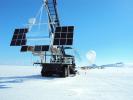RESEARCH SUPPORT
Investing in research infrastructure
August 29, 2023
Share
![[Queen's Art of Research Photo: "Perfusion of Light" by Raymond Sturgeon]](/gazette/sites/gazettewww/files/assets/stories/2020/Sturgeon2015_1000x667.jpeg)
Ground-breaking STEM research is fueled by talented teams leveraging state-of-the-art infrastructure. Labs, equipment, and facilities are all necessary tools to support research innovation and help to maintain Canada’s competitiveness on the global stage.
Today, the Honourable Randy Boissonnault, Minister of Employment, Workforce Development and Official Languages announced more than $2M in funding for Queen’s from the Canada Foundation for Innovation’s (CFI) John R. Evans Leaders Fund (JELF). The support will equip Queen’s researchers with the infrastructure they need to advance STEM innovations – from a seismic monitoring system to informatics for cancer biomarkers. The CFI announcement is part of a larger $960M suite of funding announced by the federal government.
"Congratulations to these talented recipients from all across the country who are doing the groundbreaking work that will contribute not only to Canada’s health and well-being but also to the world’s," says the Honourable François-Philippe Champagne, Minister of Innovation, Science and Industry. "Through this funding, the Government of Canada is investing in the next generation of researchers and inspiring them to continue to think outside the box and tackle the challenges of today and tomorrow."
The John R. Evans Leaders Fund helps Canadian universities recruit and retain outstanding researchers, acquire the tools that enable their innovative work, and offer them research support in combination with partner organizations. Recipients are recognized as innovative leaders or have demonstrated the potential for excellence in their fields. In total, 396 projects at 56 institutions received $113M.
The JELF-funded Queen’s projects:
Faith Brennan (Biomedical and Molecular Sciences): Harnessing Macrophage Biology to Control Neuroinflammation – $150,000
Sebastien Talbot (Biomedical and Molecular Sciences): Neuro-immunity in Cancer and Allergy – $250,000
Rachel Baker (Chemical Engineering): Exploring the Landscape of Electrochemical Reactions and Improving Process Sustainability through Paired Synthesis – $125,000
Lucia Lee (Chemistry): Functional Structures Based on Main-group Supramolecular Interactions – $125,000
Joshua Woods (Civil Engineering): Systems for Seismic Protection and Resilience of Mass Timber Structures – $125,000
Burton Ma (Computing): Seeing the Invisible: A Precision Medicine Informatics for Cancer Biomarkers Anchored in Time and Space – $75,001
Suzan Eren (Electrical and Computer Engineering): Fast-charging Infrastructure for Electric Vehicles – $97,536
Ryan Grant (Electrical and Computer Engineering): Smart Networks for Scientific Computing – $152,000
Melissa Greeff (Electrical and Computer Engineering): Resilient Agile Aerial Autonomy – $125,000
Matthew Pan (Electrical and Computer Engineering): Facilitating Bidirectional Communication for Fast and Flexible HumanRobot Collaboration – $152,000
Jennifer Day (Geological Sciences and Geological Engineering): Thermo-Hydro-Mechanical Coupled Rock Performance: Transforming Design of Geological Storage and Resource Developments – $200,000
Hom Nath Gharti (Geological Sciences and Geological Engineering): Geophysical Monitoring and Modelling of the Subsurface of Urban Environments and Large Infrastructures – $100,000
David McLagan (Geological Sciences and Geological Engineering; Environmental Studies): FEWA Contaminant Biogeochemistry Lab: Holistic Assays of Hg Biogeochemical Cycling in Forest Ecosystems – $120,000
Jackson Crane (Mechanical and Materials Engineering): Controlling Detonation Instabilities: Experiments and Models to Enable Next-generation Engines – $80,000
Laura Fissel (Physics, Engineering Physics, and Astronomy): Building a Stratospheric Balloon-borne Instrumentation Laboratory – $75,001
Abbas Taheri (Robert M. Buchan Department of Mining): Time-dependent Rock and Joint Behaviour in Deep Underground Environments – $175,600
Teresa Purzner (Surgery): Identifying Predictors of Recurrence and Developing Novel Therapies for Patients with Brain Tumours – $100,000
To learn more about this round of JELF recipients, visit the CFI website. You can also read about Queen’s success in recent SSHRC Partnership and Insight and NSERC Discovery grants competitions in the Queen's Gazette.


![[SNO+ detector at SNOLAB]](/gazette/sites/gazettewww/files/styles/xsjpg1x3to2/public/2024-04/McDonald-Institute-funding-1800x1200-Gazette.jpg?itok=6Lwe0LRj)
